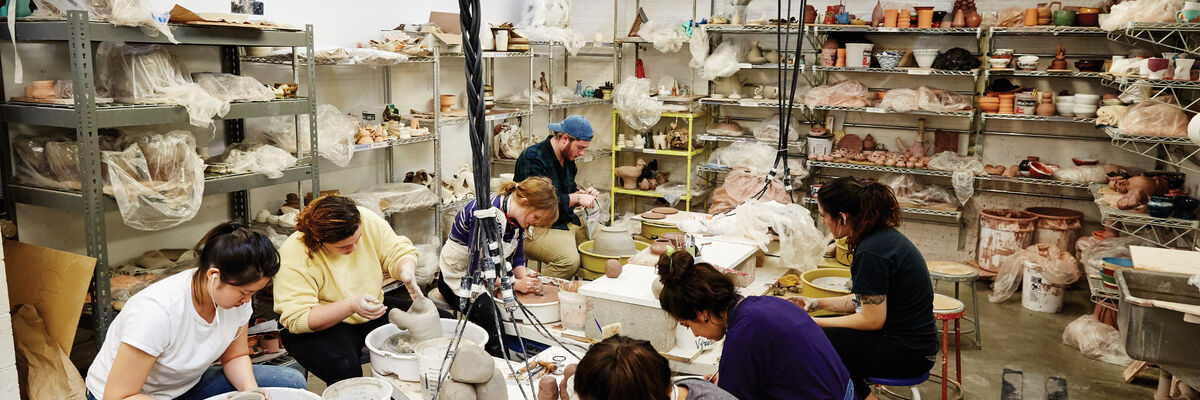
Make It Work
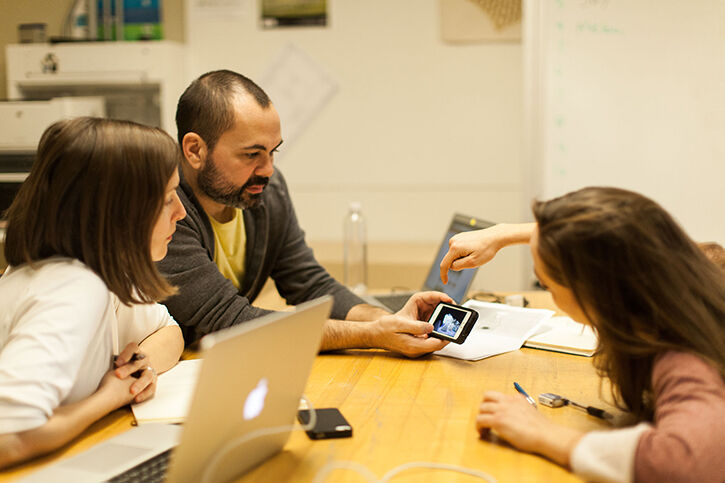
by Jac Kuntz (MA 2016)
Chalkboards and whiteboards line the walls of a classroom: notes, lists, budgets, and diagrams are scribbled across them. A long table runs the length of the room, covered in papers, laptops, and product prototypes. Some students are building websites; others work in 3D development software. All have pages of research and spreadsheets open for reference.
This is SAIC’s new yearlong creative enterprise class, Venture Studio. Students in the class are developing business models or services, inventing and marketing products, or pursuing large-scale creative projects. The class culminates at the University of Chicago’s Chicago Innovation Exchange, where student projects will be reviewed for business incubation toward launch. Innovative ideas, however, cannot get off the ground on their own. They need a support system and, most importantly, they need start-up capital. The class uses Kickstarter as an initial crowd-funding source, but there is a need for additional support. This is where SAIC’s new MakeWork Council comes in.
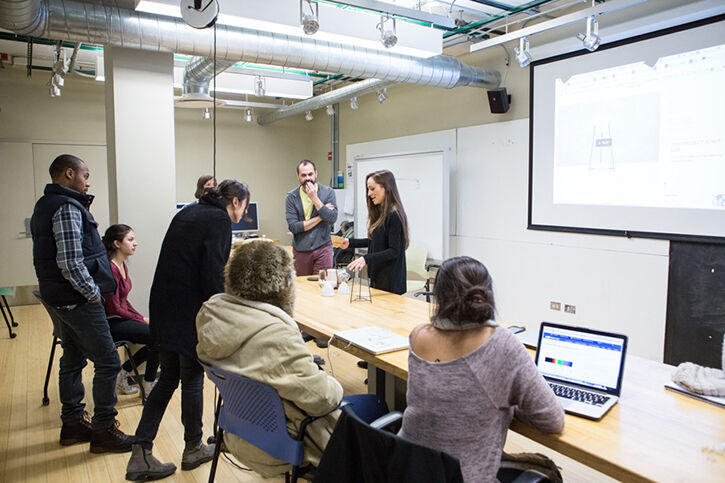
In spring 2015 SAIC launched a council that offers a new kind of donor relationship with the School. Comprising SAIC alumni and friends from the Chicago and San Francisco business and tech communities, the members of the SAIC MakeWork Council have direct contact with entrepreneurial-minded SAIC students, serving as a network of professional advisors and mentors
MakeWork Council is led by co-chairs: Neal Sales-Griffin, CEO of the Starter League, and SAIC alum DJ Catrow (MFA 2012), co-founder of Studio 424. Catrow, who has dedicated his company’s design services to the MakeWork Council, says he experienced firsthand the difficulty of starting a new business after graduation. “I couldn’t tell you how amazing five or ten thousand dollars would have been leaving school [to start a] business,” he says. “It’s those little investments that can jumpstart someone’s [career] and make them feel like their idea is viable.”
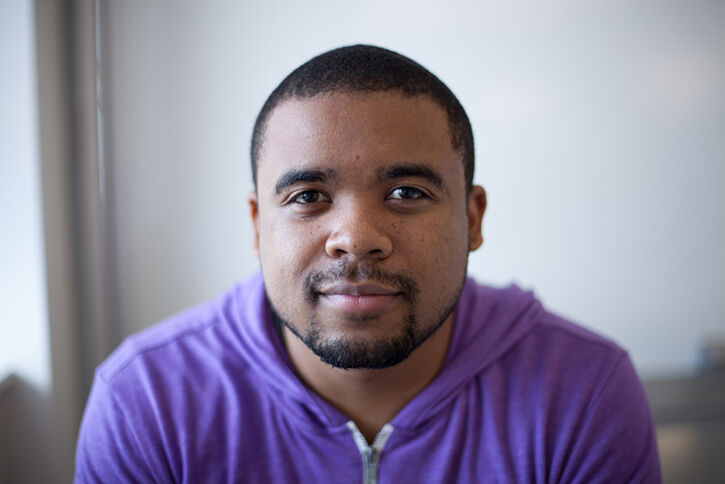
The council’s first order of business was to create a MakeWork venture fund to provide seed money for selected students, like those in Venture Studio. Kendra Foley, council member and SAIC’s executive director of individual giving, notes, “The fund will serve to assist students in their launch, providing a more financially stable ground on which to build their businesses while they make their initial prototypes and bring in first clients.” Students will compete for the funding by presenting their ideas to members the council. The first competition is slated for March 2016.
Even in a major city driven by a creative economy, monetary support is not the only factor needed to launch a successful endeavor. Marketing, professional branding, web presence, product development, a customer base, and collaborative community are all vital parts that need to be in place. Sharon Burdett and Pablo Garcia, faculty in the Department of Architecture, Interior Architecture, and Designed Objects (AIADO), are co-teaching the first iteration of Venture Studio. Garcia is an award-winning architect and designer who produces internationally exhibited work; Burdett is the co-owner of Chicago-based Strand Design. Both know the challenges and pitfalls of sustaining a business.
Each day, the professors tackle the nuts and bolts of business—from professional etiquette to data analysis and online tools. Students learn how to succeed as professional makers and marketers. “It seems artists and designers often, naturally, become independent professionals but are rarely taught business skills,” says Burdett. “This isn’t about presenting oneself to an agent, or a gallery, or a retailer, it’s just you—and that’s empowering.” Garcia adds. “By the end of the year, everyone in the class will have had professional experience, having made something, proposed something, got funded, figured out how to produce it, and got paid for it.”
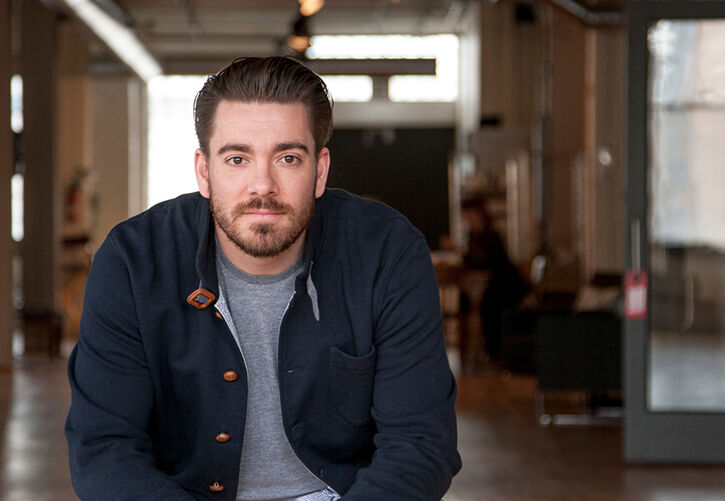
The 12 students in Venture Studio are from varying departments: Designed Objects, Ceramics, Architecture, Painting and Drawing, and Sound, to name a few. The variety of skill sets and interests are evident in the breadth of projects. Some students are working in the wood shop or with CAD software to develop prototypes, such as a thermal-responsive clock and an LED night sky simulator that moves with time. Two students are using the class to take their existing business and artistic practice to the next level: to publish a book of illustrations and to open a menswear store. Still others resist categorization and prove the versatility of the resources provided. One student is creating an archive of Chicago’s radio frequency spectrum using a specialized software to decode and identify local communication signals. Overall, the class embodies SAIC’s emphasis on an interdisciplinary, student-driven education.
For Catrow, his art education at SAIC was formative in building his own company. “The biggest differentiator for why and how art school has a robust group of entrepreneurs is because the School is teaching students how to think in a way that is different than their traditional education,” he says. For co-Chair Sales-Griffin, this type of creative thinking inspired him to help lead the SAIC MakeWork Council. He says, “I hope the council can ignite a movement to enable more young creatives to become entrepreneurs in Chicago and beyond.”
Through the SAIC MakeWork Council and the Venture Studio course, SAIC is shaping a new type of creative business—allowing art and design students to build their own career from the ground up.
For more information or if you are interested in participating in the MakeWork Council, please contact Kendra Foley, Executive Director of Individual Giving, 312.499.4971 or kfoley@saic.edu.
